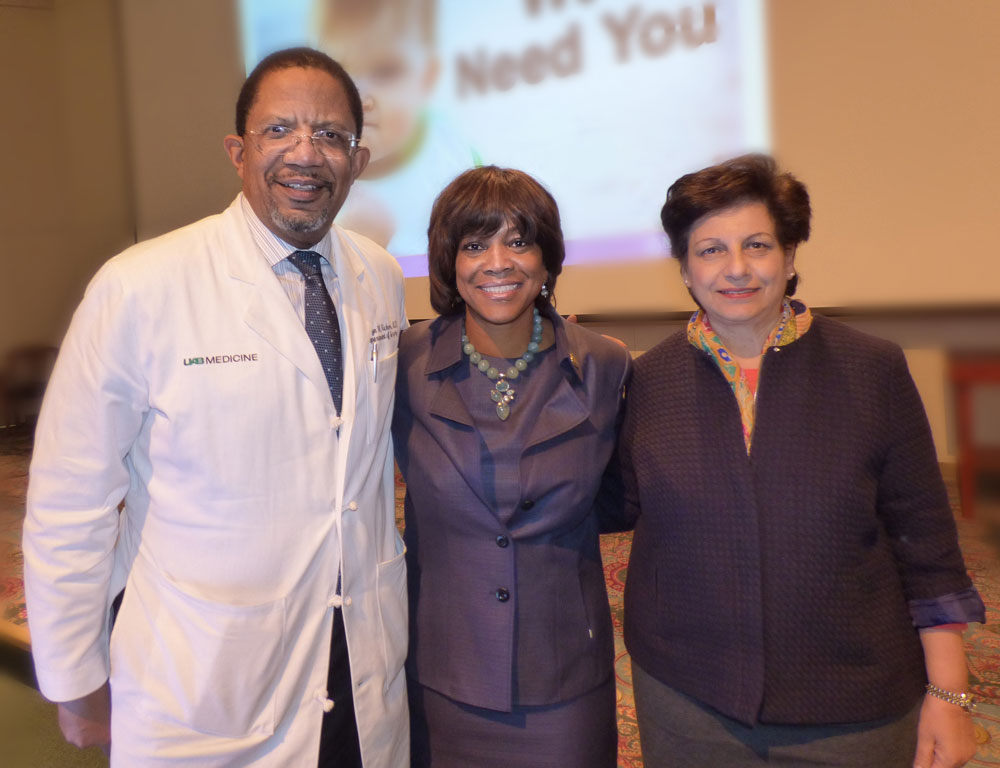 Dr. Valerie Montgomery Rice (center), pictured with Dr. Sewlyn M. Vickers and Dr. Mona Fouad. In celebration of both International Women’s Day and Women’s History Month, the UAB School of Medicine Office for Diversity and Inclusion sponsored on March 22 a visit from Valerie Montgomery Rice, M.D., dean of the Morehouse School of Medicine and the first woman to lead this free-standing medical institution.
Dr. Valerie Montgomery Rice (center), pictured with Dr. Sewlyn M. Vickers and Dr. Mona Fouad. In celebration of both International Women’s Day and Women’s History Month, the UAB School of Medicine Office for Diversity and Inclusion sponsored on March 22 a visit from Valerie Montgomery Rice, M.D., dean of the Morehouse School of Medicine and the first woman to lead this free-standing medical institution. Selwyn Vickers, M.D., senior vice president for Medicine and dean of the UAB School of Medicine, introduced Montgomery Rice, who has received numerous accolades, including the National Coalition of 100 Black Women – Women of Impact (2014); American Medical Women’s Association Elizabeth Blackwell Medal (2011); and Working Mother Media Multicultural Women’s Legacy Award (2011).
Montgomery Rice addressed a full audience at Spain Auditorium over lunch, speaking on the importance of women in medicine and science. “It’s crucial that women have advocates in medicine and science,” she stated, “and it’s crucial that those advocates are not only women.” Raised by a single mother in the Deep South, she experienced obstacles of socioeconomic status, race and gender as she mapped out a challenging career path which included an undergraduate degree at Georgia Tech and a medical degree at Harvard Medical School. In spite of challenges of structural inequity and biased perceptions, she achieved the elite position of dean of the School of Medicine and Senior Vice President of Health Affairs at Meharry Medical College, where she founded and directed the Center for Women’s Health Research, before assuming the position of dean at Morehouse.
Her personal experiences, coupled with her research, led her to conclude that where health and socioeconomic well-being are concerned, “education is the great equalizer.” Yet, she pointed out, too often women are deterred from pursuing educational opportunities in STEM fields. Although the gender gap is narrowing in many scientific arenas, significant disparities still persist. These disparities are due to a number of factors, Montgomery Rice noted. Between third and fifth grade, there is a significant drop in female students’ interest in STEM fields. As women move along the educational spectrum, they encounter perceptions about their commitment to their careers that are not experienced by men – for example, the concern that parenthood will impair their ability to function professionally. Women have more difficulty finding mentors and sponsors within academic medicine, which can, in turn, affect their ability to receive funding for their projects or to be considered for promotion or tenure.
“For true parity to occur, we must have diversity at the table,” she said. “And a constant level of mentorship and sponsorship.” She presented data which demonstrated that when women are satisfied in their career and feel supported professionally, they are more likely to pursue new opportunities for career advancement. This will, in turn, lead to more women on the higher rungs of leadership, who can serve as mentors and sponsors to younger faculty and trainees.
“We must welcome diversity and see it as an opportunity to advance our mission. Operating in the same way year after year will not give us different results.”